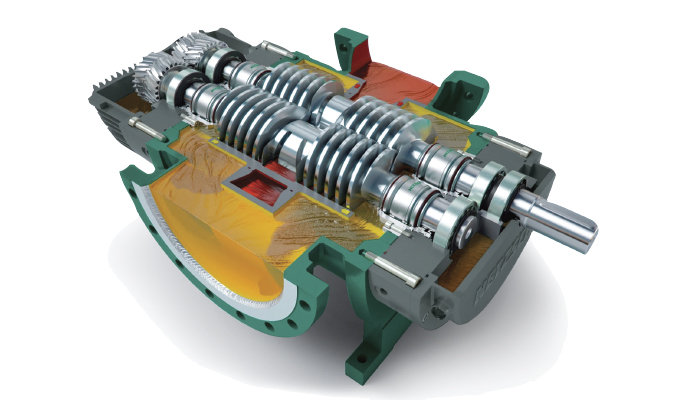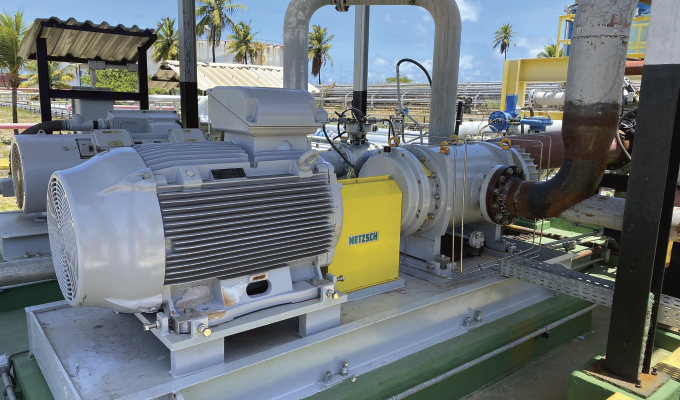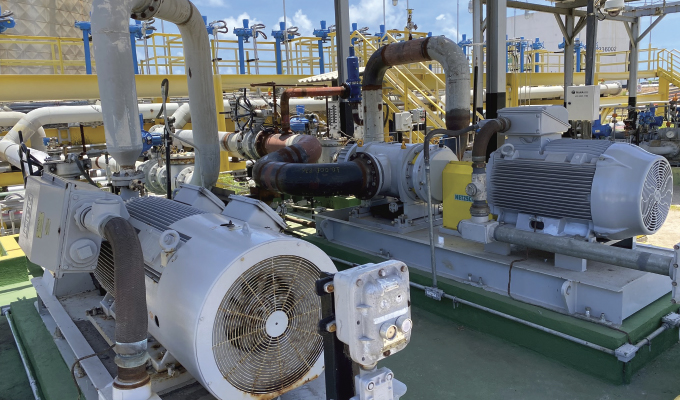At a tank farm in a Brazilian sea port, two centrifugal pumps were used for transferring heavy oil from storage tanks to road tankers or vessels until February 2020. This required the high viscosity of the medium to be reduced by means of diesel injection, costing the owner at least $2,000 each day. In addition, the centrifugal pumps regularly broke down due to cavitation damage. The owners decided to initially replace one of the two centrifugal pumps with a NOTOS® multi screw pump from Netzsch.
Due to its very good suction capabilities, the selected four-screw 4NS is also suitable for highly viscous media with up to 200,000 cSt, achieving a flow rate of up to 792,500 gallons per hour. After commissioning, it became evident that—in contrast to the remaining centrifugal pump—the multi screw pump was running without cavitation even at significantly higher flow rates. Another benefit was that the extensive addition of diesel was no longer required. Based on this positive experience, the customer decided in February 2020 to also replace the second centrifugal pump with a NOTOS. Moreover, it became evident that the power consumption could be reduced significantly.
The pumps, which are used for moving heavy oil from a tank farm to road tankers or vessels at a sea port in northeast Brazil, are primarily needed during dry periods. That is because the hydropower plants in this country produce less energy during those periods, which increases the demand for heavy oil. Until February 2020, this transfer had been implemented with two centrifugal pumps, which, however, had struggled with the high viscosity of the medium. The poor suction capability of conventional centrifugal pumps means that some of the oil remains in the tank and cannot be used. In addition to this, unsuitable technology can lead to cavitation, which will cause the pumps to fail in the long run.
Cavitation was also an issue on the two centrifugal pumps at the Brazilian tank farm. Due to the high viscosity, the system had a lower NPSHa value, particularly at night, which made it necessary to add expensive diesel to the heavy oil in order to reduce the viscosity. Around 792 gallons had to be added each day, at a cost of at least $2,000 per day. To increase the reliability and efficiency of the process and to lower energy costs, the owners decided to replace one of the two centrifugal pumps with a NOTOS® multi screw pump from Netzsch and to compare the performance of the two units.

ROBUST PUMP FOR MEDIA WITH UP TO 200,000 CST
The NOTOS series generally comprises multi screw pumps with two (2NS), three (3NS), or four (4NS) screws that can be used flexibly for different viscosities, even for large flow rates. The tank farm in Brazil required a pump that could transport up to 52,834 gallons per hour of heavy oil with a pressure of 18 bar, a temperature of 50 to 122 degrees Fahrenheit and a viscosity of up to 9,000 cSt. The owner of the tank farm selected a 4NS twin-screw pump, which is available for flow rates of up to 792,500 gallons per hour and is suitable for highly viscous media with up to 200,000 cSt.
The pump stands out on account of its high level of robustness, it is resistant to dry running and can be manufactured from materials that are specially selected for the application at hand. State-of-the-art production technologies enable narrow tolerances between the dynamic and static components, reducing the return flow. In combination with the flow optimized shape of the pump chamber, this results in a high level of efficiency.

LOW NPSHR VALUE PREVENTS CAVITATION

Apart from efficiency, however, the flexibility of this pump in terms of the viscosity of the pumped medium was particularly crucial for the owner of the Brazilian tank farm. While centrifugal pumps have a narrow operating range and their efficiency reduces drastically as the viscosity increases, NOTOS multi screw pumps work across the entire viscosity spectrum with very good efficiency. This pumping concept is based on the interaction between the screws and the housing. It forms conveying chambers in which the medium is continuously moved from the intake side to the discharge side at stable pressure—almost independent of medium consistency or viscosity. The flow rate is influenced by pump speed, screw diameter and screw pitch. It is consequently directly proportional to the speed and can be variably adjusted through it.
SAVING ENERGY COSTS WITH MORE EFFICIENT PUMP TECHNOLOGY
The pumps are adapted to the application at hand in order to achieve the best possible performance. This mainly applies to the pump size and its tolerances, but also to the accessories. Overpressure valves, a variety of different sealing systems and bearing monitoring devices using temperature and vibration sensors are available, for example. For the application in Brazil, the viscosity of the medium in combination with the pump speed required a double seal with an external sealing system. At the customer’s request, this was designed to be API compliant.
As the 4NS can run with highly viscous media, no diesel injection was required. This in turn resulted in a cost reduction of $2,000 per day. In addition, this pump runs much more efficiently with such viscous media, which reduced the power consumption by over 40 percent to 65 kW. This saved even more energy costs—in particular because the second existing centrifugal pump was also replaced with a 4NS after the successful test phase in February 2020.

FOR MORE INFORMATION
Vitor Assmann is senior sales manager at Netzsch do Brasil. The Netzsch Group is an owner-managed, international technology company with headquarters in Germany. The Netzsch business units Analyzing & Testing, Grinding & Dispersing, and Pumps & Systems represent customized solutions at the highest level. More than 4,000 employees in thirty-six countries and a worldwide sales and service network ensure customer proximity and competent service. For more information, visit www.netzsch.com.
MODERN PUMPING TODAY, April 2024
Did you enjoy this article?
Subscribe to the FREE Digital Edition of Modern Pumping Today Magazine!


